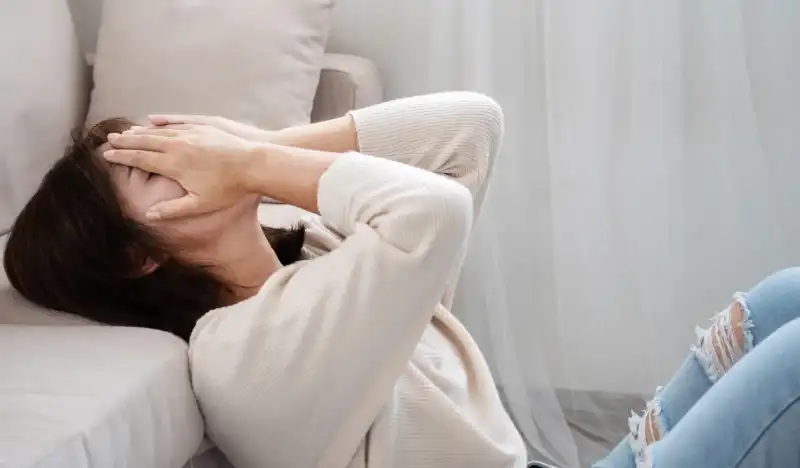
Table Of Contents:
- What Is Dual Diagnosis (Co-Occurring Disorders)?
- What Is Anxiety?
- How Does Addiction Affect Anxiety?
- How Does Anxiety Affect Addiction?
- What Drugs Cause Anxiety?
- What Drugs Treat Anxiety (Under Medical Supervision)?
- When to Seek Help for Anxiety and Addiction
- How to Treat Anxiety and Addiction Together
- Finding the Right Help

Living with both anxiety and addiction can feel overwhelming. Anxiety can make recovery harder, and substance use can make anxiety worse – creating a difficult cycle that’s hard to break. The good news is that with the right support and integrated treatment, healing is possible.
“When someone suffers from both a mental health condition and a substance use disorder, treating them together – not separately – is the most effective path forward.”
– Dr. Ash Bhatt, MD, Chief Medical Officer, AddictionResource.com
What Is Dual Diagnosis (Co-Occurring Disorders)?
A dual diagnosis, also called co-occurring disorders, means a person experiences both a mental health condition and a substance use disorder at the same time. For example, someone may struggle with anxiety while also battling alcohol or drug addiction.
According to the National Institute of Mental Health (NIMH), co-occurring disorders are common and require integrated treatment – addressing both conditions simultaneously rather than one after the other. When anxiety is treated but addiction is not (or vice versa), symptoms often return or worsen.
You can learn more about dual diagnosis through MedlinePlus, a trusted health information resource from the U.S. National Library of Medicine.
What Is Anxiety?
Anxiety is a normal emotion that everyone experiences, but when it becomes persistent, intense, or interferes with daily life, it may be classified as an anxiety disorder.
The National Institute on Drug Abuse (NIDA) notes that anxiety disorders are among the most common mental health issues linked with substance misuse. Many people use alcohol or drugs as a form of “self-medication,” which can lead to dependence or addiction.
Common symptoms include:
- Restlessness or a sense of dread
- Racing thoughts or constant worry
- Tense muscles and trembling
- Rapid heartbeat or chest tightness
- Trouble sleeping or concentrating
How Does Addiction Affect Anxiety?
Different substances affect anxiety in different ways:
| Substance | Short-Term Effect | Long-Term or Withdrawal Effect |
| Alcohol | Temporarily relaxing | Rebound anxiety, poor sleep, panic attacks |
| Opiates (heroin, painkillers) | Emotional numbness | Heightened anxiety and irritability during withdrawal |
| Methamphetamine | Boosted energy | Paranoia, agitation, panic |
| Adderall / Stimulants | Increased focus | Anxiety, restlessness, insomnia |
| Xanax / Benzodiazepines | Fast relief | Dependence and rebound anxiety after stopping |
| Marijuana | Short-term calm | Can trigger panic or paranoia, especially in high doses |
How Does Anxiety Affect Addiction?
People with anxiety may turn to substances to escape constant worry or fear – a behavior known as self-medication. Unfortunately, this relief is temporary. Over time, drugs and alcohol can worsen anxiety, leading to a stronger dependence cycle.
The NIMH explains that untreated anxiety can alter how the brain processes fear and reward, increasing vulnerability to addiction and making recovery more challenging.
What Drugs Cause Anxiety?
Some drugs can trigger or intensify anxiety, especially with frequent or high-dose use.
- Stimulants like cocaine, methamphetamine, or Adderall
- High-THC marijuana strains
- Caffeine and energy drinks
- Alcohol and benzodiazepine withdrawal
- Nicotine in cigarettes or vapes
What Drugs Treat Anxiety (Under Medical Supervision)?
Certain medications can help manage anxiety – especially when combined with therapy. According to MedlinePlus and NIMH, common treatments include:
- SSRIs or SNRIs such as sertraline, escitalopram, or venlafaxine
- Buspirone for generalized anxiety
- Beta-blockers for physical symptoms like shaking or rapid heartbeat
- Short-term benzodiazepines (only under strict supervision if addiction history exists)
When to Seek Help for Anxiety and Addiction
It may be time to seek help if you:
- Use substances to calm anxiety or “get through” the day
- Experience panic, tremors, or insomnia when not using
- Notice your mental health declining despite substance use
- Have difficulty functioning at work, school, or home
- Feel hopeless or unable to stop using
How to Treat Anxiety and Addiction Together
The most effective approach is integrated treatment, where both conditions are addressed within the same care plan. According to SAMHSA and NIDA, evidence-based dual diagnosis programs often include:
- Comprehensive assessment to evaluate both conditions.
- Therapies such as cognitive behavioural therapy (CBT), exposure therapy, and relapse prevention.
- Medication-assisted treatment (MAT) when needed for alcohol or opioid dependence.
- Peer support and group therapy to reduce isolation and build resilience.
- Long-term follow-up care to manage relapse risk and anxiety triggers.
Finding the Right Help
Recovery takes time, but it’s absolutely possible. With professional support, you can manage anxiety, overcome addiction, and reclaim your peace of mind.
If you or a loved one is struggling with anxiety and addiction:
- Read more about co-occurring disorders on NIMH.
- Explore treatment options on SAMHSA.gov.
- Learn how substance use impacts mental health atnih.gov.
Find Drug Rehabilitation Centers Near You Anywhere In the US
Addiction Resource team has compiled an extensive list of the top drug rehabilitation facilities around the country. Use our locator tool to find the best centers near you.


 Reviewed by:
Reviewed by:  Written by:
Written by: 
 FindTreatment.gov
FindTreatment.gov